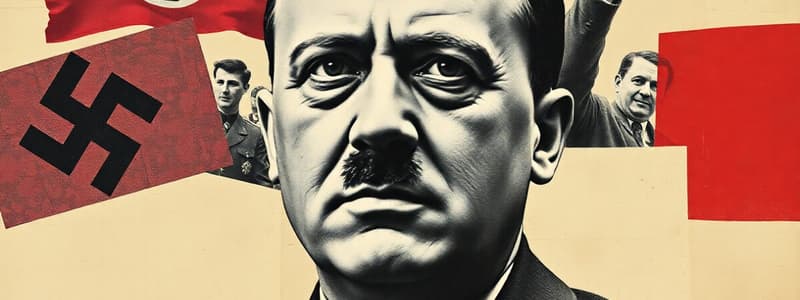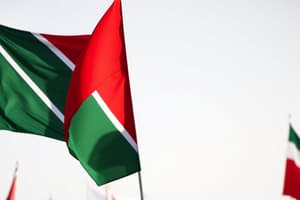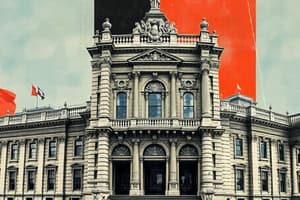Podcast
Questions and Answers
Hver var leiðtogi Þýskalands á árunum 1933-1945?
Hver var leiðtogi Þýskalands á árunum 1933-1945?
- Franklin D. Roosevelt
- Mussolini
- Stalin
- Hitler (correct)
Þjóðernishyggja snýst um að þjóðin sé stærri og mikilvægari en aðrar þjóðir.
Þjóðernishyggja snýst um að þjóðin sé stærri og mikilvægari en aðrar þjóðir.
True (A)
Hvað var fasismi?
Hvað var fasismi?
Fasismi er stjórnarfar þar sem ríki stjórnar öllu mjög strangt og leggur áherslu á að þjóðin sé sterk.
Eftir fyrri heimsstyrjöldina þurftu Þjóðverjar að borga mikla peninga vegna _____ .
Eftir fyrri heimsstyrjöldina þurftu Þjóðverjar að borga mikla peninga vegna _____ .
Tengdu ár til viðeigandi atburða:
Tengdu ár til viðeigandi atburða:
Hvað gerðu Þjóðverjar til að reyna að leysa verðbólguna eftir fyrri heimsstyrjöldina?
Hvað gerðu Þjóðverjar til að reyna að leysa verðbólguna eftir fyrri heimsstyrjöldina?
Verðbólga og kreppa eru það sama.
Verðbólga og kreppa eru það sama.
Hvað gerðist í Þýskalandi árið 1938?
Hvað gerðist í Þýskalandi árið 1938?
Flashcards
Hvað er fasismi?
Hvað er fasismi?
Fasismi er stjórnarform þar sem ríkið hefur mjög mikið vald. Það stjórnar öllu í samfélaginu á mjög strangt og einræði hátt. Fasismar áhersla er á þjóðhyggju, þar sem þjóðin er talin mikilvægari en einstaklingar. Þeir sem stjórna líta á sig sem leiðtoga þjóðarinnar og búast við fullri hlýðni.
Hvað er þjóðernishyggja?
Hvað er þjóðernishyggja?
Þjóðernishyggja er hugmyndafræði sem leggur áherslu á mikilvægi þjóðarinnar. Þjóðernishyggjumenn telja að þeirra þjóð sé betri en aðrar og leggja áherslu á að vernda menningu, tungumál og hefðir hennar.
Hver var Hitler?
Hver var Hitler?
Adolf Hitler var leiðtogi Þýskalands á árunum 1933-1945. Hann var leiðtogi nasista og ábyrgur fyrir seinni heimsstyrjöldinni, sem og helförinni þar sem milljónir manna voru myrtir.
Af hverju var verðbólga í Þýskalandi?
Af hverju var verðbólga í Þýskalandi?
Signup and view all the flashcards
Er verðbólga og kreppa það sama?
Er verðbólga og kreppa það sama?
Signup and view all the flashcards
Hvað var Versalasamningurinn?
Hvað var Versalasamningurinn?
Signup and view all the flashcards
Hvað var München áróðursviðtakið?
Hvað var München áróðursviðtakið?
Signup and view all the flashcards
Hvað var Münchenarsamningurinn?
Hvað var Münchenarsamningurinn?
Signup and view all the flashcards
Study Notes
Fascism
- Fascism is a system where a single state controls everything very strictly.
- It dictates what people can and cannot do.
- Fascism emphasizes a strong nation and obedience to a leader.
- Examples include Mussolini in Italy and Nazism.
Nationalism
- Nationalism is the belief that one's nation is more important than others.
- It involves preserving language, traditions, and culture.
- Nationalists often resist outside influence.
Adolf Hitler
- Hitler led Germany from 1933 to 1945.
- He was a destructive figure seeking German global dominance.
- He initiated World War II and orchestrated the genocide of millions of Jews and others.
German Inflation
- Post-World War I Germany faced severe economic hardship.
- Reparations to other nations imposed heavy financial burdens.
- Excessive printing of money devalued currency, causing high prices.
- Consequently, essential goods became unaffordable for many.
Inflation vs. Depression
- Inflation and depression are related but distinct.
- Inflation is a rising cost of goods and services, diminishing purchasing power.
- Depression is widespread unemployment and lack of economic activity.
Key Dates
- 1919: Germany signed the Treaty of Versailles, agreeing to significant post-war payments.
- 1923: Hitler's failed attempt to seize power in Munich.
- 1933: Hitler became Chancellor of Germany.
- 1938: Germany annexed parts of Czechoslovakia through the Munich Agreement.
- 1939: Germany invaded Poland, initiating World War II.
Studying That Suits You
Use AI to generate personalized quizzes and flashcards to suit your learning preferences.




